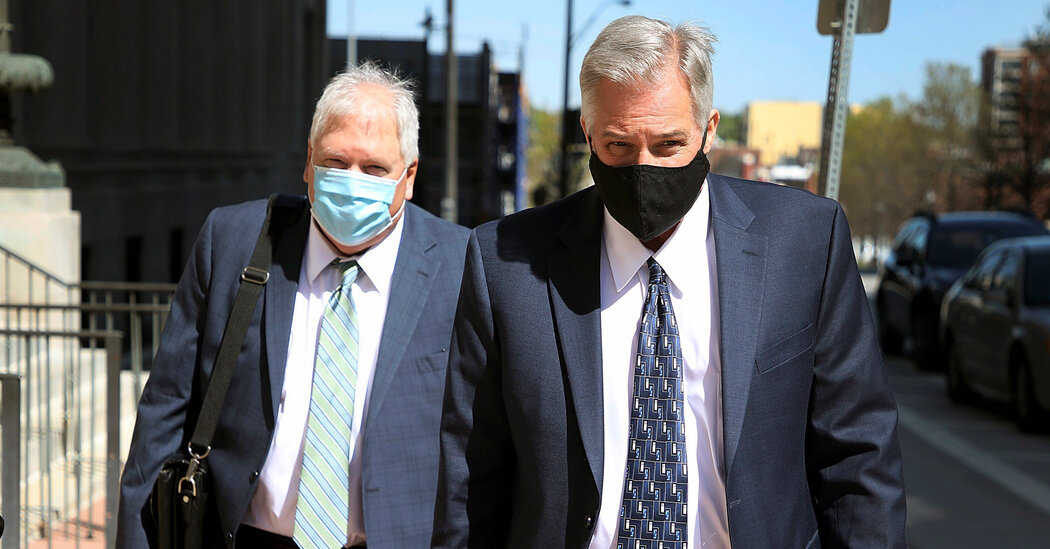Shannon Kepler, who had served as a police officer in Tulsa for 24 years, was tried five times before a federal jury found him guilty of the 2014 murder of Jeremey Lake, 19.
A former police officer in Tulsa, Okla., was sentenced on Friday to 25 years in prison for the 2014 killing of his daughter’s boyfriend after a jury found him guilty of second-degree murder in his fifth trial in the case.
Shannon Kepler, 60, was a 24-year veteran of the Tulsa Police Department when he shot and killed Jeremey Lake, 19, outside Mr. Lake’s home near downtown Tulsa in August 2014, federal prosecutors said. Mr. Kepler tracked Mr. Lake down after running his name through a law enforcement database, the authorities said.
At the request of Mr. Lake’s family, Judge Gregory Frizzell of the U.S. District Court for the Northern District of Oklahoma also ordered Mr. Kepler to pay the cost of a headstone for Mr. Lake.
Mr. Kepler’s lawyer, Stan Monroe, did not immediately respond to an email and phone calls seeking comment on Sunday.
Clint Johnson, the U.S. attorney for the Northern District of Oklahoma, said in a statement that Mr. Kepler had “sworn to uphold the law but instead made a series of decisions that led to the young man’s murder.”
He added that Judge Frizzell’s decision provided “a measure of justice to Mr. Lake’s family, though I know their healing continues.”
Mr. Kepler’s first three trials ended with the jury deadlocking on the murder charge, though the first jury found him guilty of two counts of reckless conduct with a firearm. In the fourth trial, in October 2017, a jury convicted Mr. Kepler of first-degree manslaughter, but he appealed that conviction on jurisdictional grounds, arguing that he should have been tried in federal court.
A week before Mr. Lake was killed, Mr. Kepler and his wife had been having “a difficult time with their adopted daughter, Lisa,” who had just turned 18, the U.S. attorney’s office said in a statement.
That behavior, which the authorities did not describe in detail, continued, and the Keplers dropped off their daughter at a homeless shelter with no extra clothes, money or a cellphone, prosecutors said.
Mr. Kepler later learned from his daughter’s Facebook profile that she was “in a relationship” with Mr. Lake, prosecutors said.
The relationship “alarmed” Mr. Kepler, prosecutors said, and at work, he asked a records clerk to “run a search” on Mr. Lake’s history.
The search turned up records showing that Mr. Lake had been a “victim of child abuse at a very young age and was previously charged as a juvenile after pushing a social services worker,” prosecutors said. The charges did not result in a conviction, they said.
Mr. Kepler then wrote down Mr. Lake’s address, changed his clothes and set out for Mr. Lake’s home after nightfall in his wife’s S.U.V. armed with a .357 magnum revolver, prosecutors said. Mr. Kepler would later testify that he knew the revolver would not leave shell casings at the scene, prosecutors said.
At about 9 p.m., he arrived at the house and saw his daughter with Mr. Lake. Mr. Kepler’s daughter would not talk to him, and she started walking toward the house, prosecutors said.
Mr. Lake was standing in the street, prosecutors said, when Mr. Kepler pulled out his revolver and shot him twice in the chest, killing him instantly. Prosecutors said he then turned and fired at least three rounds in the direction of the witnesses: his daughter, a friend of Mr. Lake’s and Mr. Lake’s younger brother.
Mr. Kepler then fled in the S.U.V., which he abandoned at a Motel 6 before turning himself in.
He later testified that Mr. Lake had “got the jump on him” and pulled a semiautomatic pistol from his pants pocket, but prosecutors said that forensic evidence had determined that the gun was from an unrelated incident.
At Mr. Kepler’s sentencing hearing, Mr. Lake’s father described his son as a selfless man who had plans to go to welding school when he was killed.





























